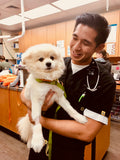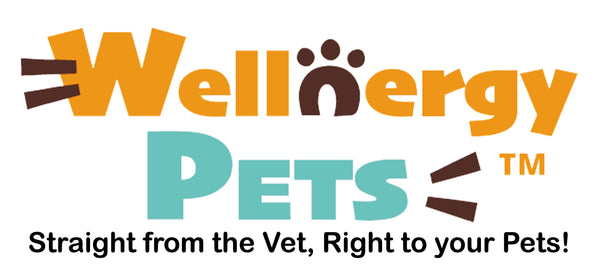Over the past week I’ve heard from so many colleagues, clients, friends, and family about the challenges and concerns across our communities we’re facing due to COVID 19, and there’s no question about it. Right now, there are many more questions than answers. Our hearts go out to those who have been impacted. As pet parents, we understand you may have specific questions about COVID 19 in pets and how to keep your pets and families safe.
During these tough times, our mission here at Wellnergy Pets remains as strong as ever: working as a team to improve the lives of people and their pets.
We will try our best to provide you with the information we know to keep you in the loop with FAQ’s, as well as an outlet and resources to keep your time at home with your pets as positive and meaningful as possible.
If you are working from home, practicing responsible social distancing, staying inside, and trying to remain healthy and happy, we hope you have your pets to keep you company. If you’re a pet lover, please feel free to read our blog posts here, listen to pet-related podcasts (such as the DRAT VET, Cone of Shame, or Can I Pet Your Dog), and look to connect with those you care about through video chats and phone calls.
Stay well, stay safe, and through all this, find moments of comfort with your pets. We are here to do the best we can for all the people and pets in the communities we serve, so our customer service team is available via email and direct messages on Facebook and Instagram. We are here for you.
What We Know
Based on what we know now, and what is known about other coronaviruses, there is no evidence that dogs or cats can be a source of COVID-19 infection to humans or other animals – or that companion animals can be infected with human COVID-19. However, this does not mean your pet cannot act as a fomite, basically, any object (such as, a towel or money or clothing or dishes or books or toys etc.) that can transmit infectious agents from one person to another (ie. a person infected with COVID-19 coughs on their dog’s face, and then allows their dog out to play with you and you in turn kiss the dog in the face, and contract the virus). Therefore, we suggest you always follow good handwashing and hygiene practices, especially before and after interacting with pets. Avoid contact with wildlife, including those kept as pets. Routinely clean and disinfect animal contact surfaces like cages and feeding areas, as well as immediately after contact with high-risk animals, such as wildlife and stray or free-roaming dogs and cats.
If your pet shows signs of coughing, sneezing, lethargy or otherwise, call your veterinarian to schedule a consult and keep them indoors as a precautionary measure. There are so many illnesses in dogs and cats usually associated with various common viral and bacterial infections (kennel cough, canine flu, etc.) that are not transmissible to people. These illnesses should be taken care of as soon as possible.
Please follow current COVID-19 health official recommendations from the World Health Organization (WHO) and U.S. Centers for Disease Control & Prevention (CDC).
Frequently Asked Questions
Are dogs and cats at risk of contracting COVID-19?
Based on what we know now, and what is known about other coronaviruses, there is no evidence that dogs or cats can be a source of COVID-19 infection to humans or other animals – or that companion animals can be infected with human COVID-19. Once again, this does not mean your pet cannot act as a fomite, basically, any object (such as, a towel or money or clothing or dishes or books or toys etc.) that can transmit infectious agents from one person to another. It’s critical to follow current health official recommendations as this situation evolves. You can get the latest information from reputable sources such as: The World Small Animal Veterinary Association, The World Organization for Animal Health (OIE)), and The U.S. Centers for Disease Control and Prevention (CDC): About Coronavirus Disease 2019 (COVID-19).
Should my pet wear a mask?
No. There’s no scientific evidence that face masks protect pets from infectious diseases or air pollutants, and masks have the potential to be unnecessarily suffocating, scary, and uncomfortable for pets.
Can manufactured pet food carry COVID-19 virus?
No. It is highly unlikely that dry or canned pet foods are potential viral vectors.
Should I get my pet tested for COVID-19?
No. At this time, testing pets for COVID-19 virus is unnecessary, as there is currently no indication that apparently healthy and unexposed pets should be tested for the virus.
What is known about other coronaviruses in cats and dogs and how do you treat it?
While there’s still no evidence to support risk of COVID-19 virus infection) to dogs or cats, there are other coronaviruses that do impact pets, none of which are transmissible to people:
- Cats: Feline enteric coronavirus (FCoV) causes a mild or asymptomatic infection in domestic cats, and most signs are gastrointestinal-related. This virus is more common in areas of higher cat numbers (catteries, shelters).
- Dogs: Two forms of coronaviruses exist for dogs. The gastrointestinal form can range from asymptomatic or mild diarrhea to severe debilitating inflammation of the small intestine, which in puppies, will occasionally result in death. The milder and more common form consists of coughing, sneezing, and nasal discharge.
There is no specific treatment for coronaviruses in dogs or cats, as mild clinical signs are unlikely to require therapy. Supportive care, including replacement of lost fluids, nutritional support, and anti-nausea medication, may be used for more severe cases. Hospitalization is rarely necessary. Antibiotics are not effective against viruses and therefore will not help treat coronaviruses.
About the Author:
 Dr. Zonram Liao D.V.M. is a Southern California native, and earned his undergraduate degree from University of California, San Diego before obtaining his veterinary degree from Ross University School of Veterinary Medicine. He is not only a firm believer in the use of supportive care supplements to improve the health and happiness of his patients, but also is a strong advocate of the benefits of preventive care medicine for his patients as well. During his free time, Dr. Liao enjoys spending his time outdoors fishing and hiking, playing basketball, watching movies, cooking, traveling, and trying new foods.
Dr. Zonram Liao D.V.M. is a Southern California native, and earned his undergraduate degree from University of California, San Diego before obtaining his veterinary degree from Ross University School of Veterinary Medicine. He is not only a firm believer in the use of supportive care supplements to improve the health and happiness of his patients, but also is a strong advocate of the benefits of preventive care medicine for his patients as well. During his free time, Dr. Liao enjoys spending his time outdoors fishing and hiking, playing basketball, watching movies, cooking, traveling, and trying new foods.


1 comment
Sound good